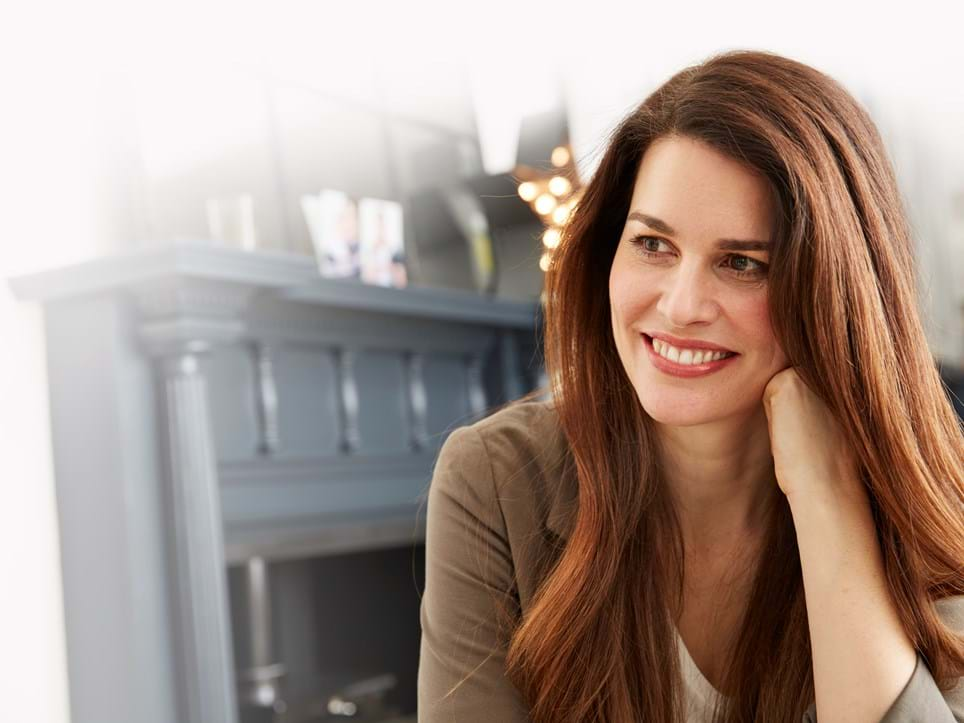Dominique Antiglio is a wellness and sophrology expert and author of The Life-Changing Power of Sophrology. Here, she shares with us how to embrace sophrology to manage stress and cultivate energy, positivity and confidence.
As a sophrologist, I regularly host events and groups around stress management for a variety of people – from high school teenagers to corporate bankers. Sophrology is a dynamic meditative practice that enhances bodily awareness so you’ll feel more grounded yet energised.
I advise starting with what’s called a recuperation practice: to consciously take 10 minutes a day to reflect within yourself. This might initially feel uncomfortable as we usually don’t like interacting with the tension in our bodies and negative thoughts in our mind, but sophrology has been designed to help harmonise this state and bring alignment to our body and mind.
There are a number of practices that can be used to reduce stress at work. If you sit at a desk all day and feel like you need a break, I recommend standing up and practising a simple body scan. Start by using activation exercises – tense and relax different parts of the body and make sure to take slow, deep breaths. This addresses your body as it balances your nervous system by increasing oxygen flow and releasing tension. This exercise also addresses the mind as you focus on the sensation and feeling present in your body. Releasing physical tension in the body can reduce mental anguish as you focus on your body relaxing.
Image courtesy of Dominique Antiglio.
When you feel highly stressed or anxious – perhaps before a new job interview or an important presentation – your breath gets restricted in your chest. This can be addressed with a quick breathing technique. Simply put your hand on your stomach and make sure that when you inhale, your tummy inflates, and when you exhale, your tummy returns to the initial position. Some people can initially find this a real challenge because their breathing pattern has been caught in their chest for years due to tension, but this technique encourages deep breathing from your diaphragm.
Movement is also key. A lot of us carry tension in the body, but through movement we can let a lot of this go. Unlike other forms of meditation, sophrology encourages you to remain mobile while practising as this allows us to connect with our body better.
Of course, your lifestyle also plays a big part in your wellbeing. If you want to improve your daily functionality, then sleep and nutrition are the two pillars that should always be considered. You can meditate for 10 hours a day, but if you eat junk food all day long, your energy levels will not improve. It’s crucial to find a balance with your lifestyle as well as adopting the sophrology techniques. 
Image courtesy of Dominique Antiglio.
And it’s important to note that these changes don’t happen overnight – sometimes taking small steps is better for you. If you’re exhausted, the last thing you’ll want to do is start a new diet or exercise regime. But sophrology can really help you recognise your exhaustion and what your body needs to recuperate. Maybe that’s a small walk in the park, lying on your sofa, or going on holiday. Sometimes it’s just about taking a break and doing nothing.
By focusing a small portion of your day on these practices, you are putting yourself at the centre of the body and mind dynamic. I encourage everyone to find 10 minutes a day to tune in to how you feel. By setting a few minutes aside to understand your body and your emotions, over time this awareness can stop you from feeling overworked and exhausted. And who wants to feel like that?
Relax, Reset and Overcome Stress– an online Sophrology course by BeSophro to help with stress management and burnout prevention, is available now via be-sophro.com.
Also on Because Magazine:
+ Learn more about Dominique's unique journey into sophrology.
+ Just a friendly Re:Minder to meditate...
+ This one-stop digital marketplace is our favourite way to embrace vintage and eco-friendly fashion.











